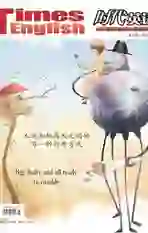跟踪导练(二)(4)
2015-04-29
阅读理解
The mother came out of the exam room to hold me up: she knew I would probably have to talk to her daughter about how she was gaining weight, she said, but please don’t use the word “fat” or even “overweight”. Don’t make her feel bad about herself.
The girl was about 8, and clearly some balance had shifted over the past year, and her weight was increasing much too fast relative to her height.
But I was as conscious of my own body as I was of hers. “How on earth,” I was thinking, “should I give nutritional advice when all they have to do is to look at me to see that I don’t follow it very well myself? How to be in line with her mother’s reasonable request? And above all, how should I help prevent from the so-called childhood obesity(肥胖)when not a week goes by that I don’t break my own resolutions?”
“The advice we’re supposed to give is ‘Eat less, exercise more,’” said Dr Julie C. Lumeng, an assistant professor at the University of Michigan Medical School and an expert in child-hood obesity.
“What does it mean when the doctor clearly can not follow the doctor’s own advice?” I asked that question of Dr David Ludwig, director of the Optimal Weight for Life Program.
“This is an issue that can cut in every possible direction,” he replied. “The doctor who is herself struggling with her weight will have the advantage of personal experience in the patient’s viewpoint—which may increase sympathy and provide other insights that a primary-care practitioner without the problem may not have.”
“On the other hand,” he continued, “the patient may view a doctor who is well overweight as lacking the basic understanding of the problem to put those principles into effect in his own life.”
There has been growing concern about childhood obesity in recent years. But meanwhile, the American children have gotten heavier. I have diagnosed Type 2 diabetes(糖尿病)in too many of my patients, and I haven’t done any major shrinking myself.
1. Why did the mother stop the doctor after her daughter was examined?
A. She knew the doctor well.
B. She wanted to get some advice.
C. She was eager to know the result.
D. She had something secret to tell the doctor.
2. What can we learn from the text about the doctor?
A. He was trying to lose weight.
B. He was an expert on childhood obesity.
C. He gave some nutritional advice to the girl.
D. He knew Dr Julie C and Dr David Ludwig well.
3. What do the underlined words in Paragraph 6 probably refer to?
A. Gaining weight.
B. Failing to reduce weight.
C. Being unable to follow the advice of his own.
D. Having no much experience in reducing weight.
4. What can we infer from the last paragraph?
A. The author feels unsuccessful in his job.
B. The American children are getting weaker.
C. Fat doctors are more concerned with childhood obesity.
D. More and more people come to care for childhood obesity.
完形填空
My kids and I would be spending the Thanksgiving Day without their father. He had 1 several months before. The two older kids were 2 with the flu. I had only about $2.5 to 3 until the end of the month.
Then I heard the phone ring. It was the 4 from the church. She said they had something to give us. So I dropped by the church on my way to the 5 .
The church secretary met me at the door and 6 me a special envelope. I opened the envelope and found two grocery certificates(杂货购物券)inside. Each was worth $20.
“Thank you very much,” I said, and as we 7 each other, I cried.
Then I went to a store and bought some 8 things and had a little over $14 groceries. As I handed the cashier(收银员)one of the gift certificates, she took it, but turned her back for what seemed like a very 9 time. I thought something might be wrong.
“This certificate is a real blessing,” I explained. “Our church gave it to my family, knowing I’m a 10 parent trying to make ends meet.”
The cashier turned 11 and replied, “Honey, do you have a turkey?”
“No.”
“Anything else for Thanksgiving dinner?”
“No. But it’s okay,” I replied.
Handing me the 12 , she said, “I can’t tell you exactly 13
now, but please go back into the store and buy a turkey, or anything else you 14 for Thanksgiving dinner.”
“Are you 15 ?” I asked.
“Yes! Get whatever you want.”
I felt awkward as I went back to do some more shopping, but I chose a fresh turkey, a few potatoes, and some juices for the children. Then I 16 the shopping cart(购物车)up to the same cashier.
“Now I can tell you,” she said, with 17 in her kind eyes. “This morning! I 18 to help someone today, and you walked through my line!”
She reached under the counter for her 19 , took out a $20 bill and paid for my groceries.
“I’m glad I could 20 ,” she said. “Here is my phone number if you ever need anything. God bless you, honey.”
1. A. returnedB. leftC. arrivedD. disappeared
2. A. satisfiedB. sadC. sickD. disappointed
3. A. lastB. helpC. spendD. take
4. A. cashierB. bossC. motherD. secretary
5. A. farmB. marketC. bankD. hospital
6. A. madeB. boughtC. wroteD. handed
7. A. sawB. huggedC. metD. talked
8. A. deliciousB. cheapC. commonD. necessary
9. A. longB. quietC. dullD. high
10. A. strictB. kindC. singleD. busy
11. A. downB. outC. upD. around
12. A. turkeyB. juiceC. changeD. envelope
13. A. whatB. whenC. whoD. why
14. A. needB. cookC. prepareD. afford
15. A. jokingB. madC. sureD. true
16. A. droveB. wheeledC. changedD. raised
17. A. tearsB. happinessC. joyD. fun
18. A. triedB. expectedC. askedD. offered
19. A. pocketB. caseC. drawerD. purse
20. A. helpB. knowC. seeD. manage
